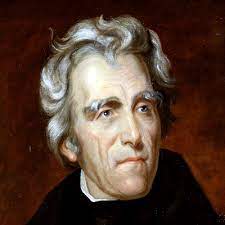Susan Parker | Andrew Jackson busy for 7 months as Florida's first governor
- Oops!Something went wrong.Please try again later.
- Oops!Something went wrong.Please try again later.
- Oops!Something went wrong.Please try again later.
Interest in the year's election for governor of Florida stretches far beyond the boundaries of our state. Florida's is one of a number of governors' races in the national spotlight right now.
Floridians began voting for a governor in 1845, after Florida became a state. For American Florida's first 24 years after the 1821 transfer to the United States, the governors were appointed. While Florida was a colony of a European nation for more than two centuries, the governors had been appointed as well.
Pedro Menendez de Aviles, the founder of St. Augustine, was granted the governorship of "La Florida" in a contract with the King of Spain in March 1565. The contract said that the governorship would be the possession of Menendez during his lifetime and, after his death, for the lifetime of a son or a son-in-law. An interesting approach to term limits.
What a huge tract of territory that was in 1565! The La Florida colony's boundaries were expansive and ill defined or even unknown. Generally the colony stretched from the Florida Keys northward into the Chesapeake Bay and to the west as far as the imagination, or at least as far as to New Spain (Mexico).
Two hundred fifty-six years later Andrew Jackson became the first governor of American Florida. Historian Daniel Schafer described Jackson's tenure as governor as "brief and tempestuous."
Susan Parker: Contentious elections are nothing new in Florida
Susan Parker: Gov. Jackson issues new rules for our old city
Susan Parker: Spanish St. Augustine plays waiting game for transfer to US
U.S. President James Monroe in March 1821 appointed Andrew Jackson to accept the transfer of Florida from Spain to the U.S. Jackson was present in Pensacola at the transfer of Spanish West Florida to the United States on July 17, 1821. Spanish East Florida had been transferred to the U.S. in ceremonies that took place in St. Augustine the previous week on July 10. But Jackson did not come to our city for that event. Jackson never came to St. Augustine, one the two capitals of the new Florida Territory.
Jackson resided in Florida's other capital city, Pensacola, for about three months while governor. Things did not go smoothly. Jackson ordered former Spanish governor of West Florida Jose Callava placed under house arrest for refusing to turn over documents that Callava claimed were Spanish possessions.
A similar argument took place in St. Augustine about delivery of documents from the Spanish period. In our city the issue was resolved when U.S. officials broke into the former-Spanish governor's residence on Charlotte Street and confiscated the boxes of Spanish East Florida's archives.

As the territory's chief executive, Jackson set forth a number of ordinances soon after the change of flags. He divided Florida into two counties — St. Johns and Escambia. Jackson retained the boundaries of the former Spanish colonies of East Florida and West Florida. In line with that decision, he set up the county courts in each.
Some of Jackson's orders were no doubt unpopular with some. He prohibited billiard rooms and the sale of alcohol to soldiers. With yellow fever widespread at this time, Jackson set forth regulations for quarantining arriving ships and created "health officers."
Jackson declared that all citizens who were residing in Florida at the time of the transfer to the United States were now eligible to be U.S. citizens and he provided the process for registering themselves as U.S. citizens.
Jackson saw that it would be necessary to recognize the Spanish legal procedures and practices that had so long been a part of Florida and declared the traditional practices would be followed in court cases when necessary. With so many documents in written in Spanish, Jackson set the fee for translations at 25 cents per 100 words. Interpreters received $2 per court case.
He established other fees for legal activities. Some of them have passed out of use, such as the $1 fee paid for the public crier (announcer) or the same price for a public whipping. The public executioner was to be paid $10 for each execution.
But Jackson was dissatisfied with his governorship. He was especially vexed that he was not able to make nearly as appointments to public offices as he had anticipated. Jackson made the appointments to county offices. President Monroe, however, chose to appoint the higher ranking officials in the Florida Territory. The President also ignored a number of Jackson's recommended nominees for to Florida posts.
Jackson departed Florida in early October 1821, saying that he needed to return to being a planter in Tennessee.

Susan R. Parker holds a doctorate in colonial history.
This article originally appeared on St. Augustine Record: Andrew Jackson became first governor of American Florida | Susan Parker

